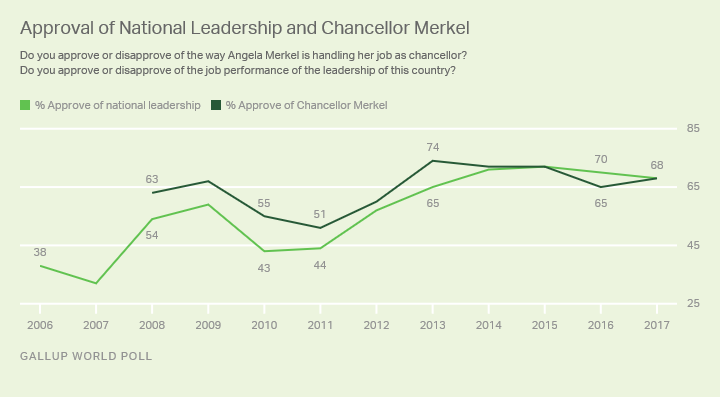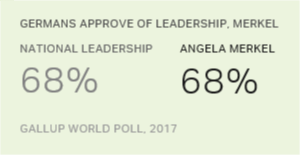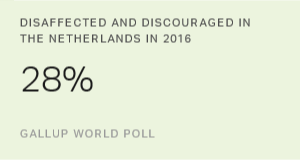Story Highlights
- Majority of Germans satisfied with elected officials, politics in general
- Women more satisfied than men with political parties
- 68% approve of both national leadership and Angela Merkel
WASHINGTON, D.C. -- While most observers consider the rise of populism among some Western nations a poke in the eye to party establishments, ahead of their general election on Sunday, Germans are largely satisfied with their elected officials and with their political system as a whole.
| Satisfied | |||||||||||||||||||||||||||||||||||||||||||||||||||||||||||||||||||||||||||||||||||||||||||||||||||
|---|---|---|---|---|---|---|---|---|---|---|---|---|---|---|---|---|---|---|---|---|---|---|---|---|---|---|---|---|---|---|---|---|---|---|---|---|---|---|---|---|---|---|---|---|---|---|---|---|---|---|---|---|---|---|---|---|---|---|---|---|---|---|---|---|---|---|---|---|---|---|---|---|---|---|---|---|---|---|---|---|---|---|---|---|---|---|---|---|---|---|---|---|---|---|---|---|---|---|---|
| % | |||||||||||||||||||||||||||||||||||||||||||||||||||||||||||||||||||||||||||||||||||||||||||||||||||
| Local elected officials | 73 | ||||||||||||||||||||||||||||||||||||||||||||||||||||||||||||||||||||||||||||||||||||||||||||||||||
| Nationally elected officials | 67 | ||||||||||||||||||||||||||||||||||||||||||||||||||||||||||||||||||||||||||||||||||||||||||||||||||
| Political party | 62 | ||||||||||||||||||||||||||||||||||||||||||||||||||||||||||||||||||||||||||||||||||||||||||||||||||
| Politicians generally in this country | 57 | ||||||||||||||||||||||||||||||||||||||||||||||||||||||||||||||||||||||||||||||||||||||||||||||||||
| How opinions are represented by politicians | 53 | ||||||||||||||||||||||||||||||||||||||||||||||||||||||||||||||||||||||||||||||||||||||||||||||||||
| Fairness of political coverage in the media | 60 | ||||||||||||||||||||||||||||||||||||||||||||||||||||||||||||||||||||||||||||||||||||||||||||||||||
| Gallup World Poll 2017 | |||||||||||||||||||||||||||||||||||||||||||||||||||||||||||||||||||||||||||||||||||||||||||||||||||
At the time of the surveys in May and June, with the current election cycle in full swing, Germans were most likely to be satisfied with their local officials (73%), followed by their nationally elected officials (67%). Roughly six in 10 reported being satisfied with their political party (62%) and the fairness of political coverage in the media (60%). Currently, the Bundestag is made up of four political parties with the potential to add two more after the election, if the FDP or AfD parties achieve the 5% threshold in the second vote. Germany's two mainstream political parties are broadly popular. In a spring 2017 study, Pew Research Center finds 58% of Germans have a favorable view of Merkel's center-right Christian Democratic Union (CDU), while the center-left Social Democratic Party (SPD) enjoys even higher favorability ratings, 68%.
A smaller majority of Germans in Gallup's survey, 57%, were satisfied with politicians in general -- although barely half of Germans (53%) are satisfied with how these politicians represent the opinions of their constituents, which could be a concern on Election Day.
While polarization dominates U.S. political discourse -- in fact, the widening gap between views of Republicans and Democrats is one of the most significant trends to emerge in American society in the past two decades -- overall there are few differences among Germans in regard to their satisfaction with their country's politics. German women are more likely than German men to be satisfied with their political party and the fairness of political coverage in the media.
Already an area with room for improvement, Germans' satisfaction with how their opinions are represented drops to less than half among those in the 45 to 59 age group (48%).
| Local elected officials | Nationally elected officials | Political party | Politicians generally in country | How opinions are represented by politicians | Fairness of political coverage in media | |||||||||||||||||||||||||||||||||||||||||||||||||||||||||||||||||||||||||||||||||||||||||||||||
|---|---|---|---|---|---|---|---|---|---|---|---|---|---|---|---|---|---|---|---|---|---|---|---|---|---|---|---|---|---|---|---|---|---|---|---|---|---|---|---|---|---|---|---|---|---|---|---|---|---|---|---|---|---|---|---|---|---|---|---|---|---|---|---|---|---|---|---|---|---|---|---|---|---|---|---|---|---|---|---|---|---|---|---|---|---|---|---|---|---|---|---|---|---|---|---|---|---|---|---|---|
| % | % | % | % | % | % | |||||||||||||||||||||||||||||||||||||||||||||||||||||||||||||||||||||||||||||||||||||||||||||||
| Age | ||||||||||||||||||||||||||||||||||||||||||||||||||||||||||||||||||||||||||||||||||||||||||||||||||||
| 15 to 29 | 69 | 67 | 61 | 58 | 52 | 66 | ||||||||||||||||||||||||||||||||||||||||||||||||||||||||||||||||||||||||||||||||||||||||||||||
| 30 to 44 | 77 | 66 | 63 | 56 | 55 | 62 | ||||||||||||||||||||||||||||||||||||||||||||||||||||||||||||||||||||||||||||||||||||||||||||||
| 45 to 59 | 70 | 68 | 58 | 58 | 48 | 57 | ||||||||||||||||||||||||||||||||||||||||||||||||||||||||||||||||||||||||||||||||||||||||||||||
| 60+ | 75 | 67 | 64 | 58 | 57 | 58 | ||||||||||||||||||||||||||||||||||||||||||||||||||||||||||||||||||||||||||||||||||||||||||||||
| Gender | ||||||||||||||||||||||||||||||||||||||||||||||||||||||||||||||||||||||||||||||||||||||||||||||||||||
| Male | 71 | 64 | 56 | 57 | 51 | 56 | ||||||||||||||||||||||||||||||||||||||||||||||||||||||||||||||||||||||||||||||||||||||||||||||
| Female | 75 | 69 | 67 | 58 | 55 | 65 | ||||||||||||||||||||||||||||||||||||||||||||||||||||||||||||||||||||||||||||||||||||||||||||||
| Education | ||||||||||||||||||||||||||||||||||||||||||||||||||||||||||||||||||||||||||||||||||||||||||||||||||||
| Completed high school | 72 | 66 | 60 | 56 | 52 | 58 | ||||||||||||||||||||||||||||||||||||||||||||||||||||||||||||||||||||||||||||||||||||||||||||||
| College graduate | 75 | 68 | 68 | 62 | 55 | 67 | ||||||||||||||||||||||||||||||||||||||||||||||||||||||||||||||||||||||||||||||||||||||||||||||
| Gallup World Poll 2017 | ||||||||||||||||||||||||||||||||||||||||||||||||||||||||||||||||||||||||||||||||||||||||||||||||||||
A Strong German Economy Likely Boosts Political Satisfaction
Economic well-being can contribute to political satisfaction and, on this score, Germany is well-placed. Employment is at a record high and heading into the election, the majority of Germans (59%) think it is a good time to find a job. With a strong manufacturing base accounting for nearly one-third of its GDP (30.3%), Germany can sustain an industrial workforce far into the future. Moreover, according to the German BDI industry association, the economy is expected to grow by more than 2% this year -- the strongest growth rate in six years.
Lending additional support to the satisfaction Germans express about their political system overall, in May and June 2017, more than two-thirds of the population (68%) approve of both their national leadership and the job Chancellor Angela Merkel is doing. While Merkel's approval has shifted over the years, it has never dipped below 51% since Gallup began tracking in 2008. Similarly, Germans' approval of the job performance of the national leadership has seen some changes over time, but ratings have been significantly higher since 2013.


Access Global Survey Data
Shape your research on global issues with access to opinions from every corner of the Earth.
Implications
In the fluid global political climate, nothing is a "sure thing." However, a recent Bertelsmann Foundation study found that 80% of Germans consider themselves "centrist" -- and, given the high rate of satisfaction with their elected officials and other aspects of political life, it appears unlikely that Germans will take this opportunity to upend its well-regarded, established political system. Of importance in the election is not only a potential fourth term for Merkel, but also the battle between the smaller parties for third place in the Bundestag -- the leaders of this party can have considerable influence in the German political arena.
Tom Abele, Managing Director IFF International, contributed to this article.
Survey Methods
Results are based on telephone interviews with 1,000 adults, aged 15 and older, conducted May 30-June 28, 2017, in Germany. For results based on the total sample of national adults, one can say with 95% confidence that the maximum margin of sampling error is ±3.6 percentage points. The margin of error reflects the influence of data weighting. In addition to sampling error, question wording and practical difficulties in conducting surveys can introduce error or bias into the findings of public opinion polls. Trended data is based on telephone interviews with approximately 1,000 adults aged 15 and older per collection period with the exception of 2011. The margin of error ranges from ±2.4 percentage points to ±4.2 percentage points.
Learn more about how the Gallup World Poll works.


